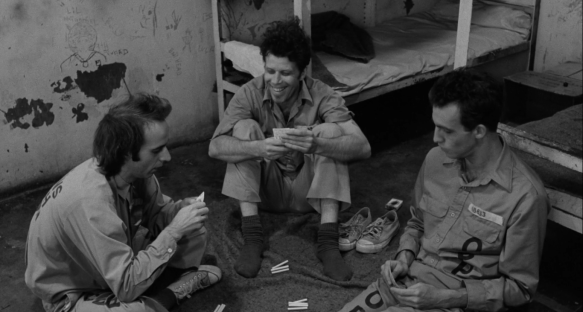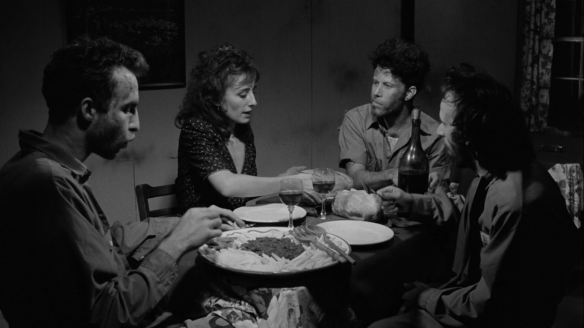
A raspy vocal emanates from the screen verging on spoken word as it sings to a mambo-infused rhythm. Casual tracking shots lead us by the local architecture at the pace of a car ambling along on a Sunday afternoon. I only confirmed after the fact this is Tom Waits singing his tune “Jockey Full of Bourbon” from an earlier album.
These are the streets of Louisana, and the man helping to capture these glorious, sweeping shots is none other than Robby Muller (probably most famous for his work with Wim Wenders). His partnership with Jim Jarmusch was just being established and it would continue well into the ’90s.
This is the opening prelude of Down by Law if you will. Because the real intimate stretches of humanity — at least the ones dwelling in this story — can be found in the dirty, dilapidated interiors and on the sketchy street corners. It’s these bombed-out, grungy aesthetics giving the film its layers of instant character.
Muller’s cinematography is an immediate asset and no matter the subject matter within the frame, he makes it feel captivating and strikingly beautiful, whether it’s a street corner, a jail cell, or a boggy bayou. We’re drawn to keep watching and relishing his images.
John Lurie is a pimp who feels like a nobody. He tries to act big only to get sucked into the shadiest of business deals. Tom Waits isn’t much better off as a disgraced disc jockey. His girl walks out of him in a fit of rage, and he proceeds to go drown his sorrows.
However, first, he must gather up his shoes from the street below where they have been unceremoniously tossed. The inhumanity of Gene Pitney’s record (I think that’s him) cast out into the street says it all — both the mood and the crispness of the photography.
I’m not sure if Tom Waits is an actor as much as he’s an enigmatic personality exuding something we can latch onto as an audience. Lurie’s not altogether intriguing to me, but with Waits there’s something different — something we want to find out more about.
The manner of this off-beat noir is now fully established because the mood is the key when plot feels almost secondary even tertiary in importance. The dialogue is laughable, but somehow it fits into this world gladly mixing both style and sendup of the past. And yet it’s only the most affectionate homage to bygone years with its chiaroscuro, smoky street corners, and fedoras to fill out a modern underworld.
It’s the kind of movie where a guy will just walk up to you on a deserted street corner and offer you keys to a Jaguar and a wad of Franklins to do his dirty work for him. Sometimes the dirty work has strings attached.
Pretty soon Zack’s in the can and Jack’s with him. What a sorry pair they turn out to be. But there is eventually a saving grace. Enter Bob. Aside from being another tribute to Jarmusch’s wildly diverse casting tendencies, Roberto Benigni holds the film together with his charming personality.
He single-handedly redefines the tone of the movie making it into a kind of reluctant buddy movie. Because his instant good nature, loquaciousness, and limitations with the English language give him the powers to add something radically different to the film’s cocktail.
If he’s ever the butt of the jokes as the foreigner, more often he’s the movie’s champion, a force of joy and goodwill bringing together two bunkmates of the most cynical and standoffish sort. When they start their giddy tirade — yelling at the top of their lungs — You scream, we scream, we all scream for ice cream, it feels like “Moses Suposes” antics taking over the jailhouse.
Even with the introduction of Benigni, there is this sense Jarmusch is once more working in these near-stagnant scenes involving shooting the bull or playing cards much like Stranger Than Paradise. It’s once more observational and altogether content in the idiosyncratic. The elliptical sense of filling the spaces in between is also surprisingly prevalent. The biggest example being, of course, the prison escape.
Tarantino would choose to not show the heist 6 years later in Reservoir Dogs. To some degree, Jarmusch beat him to the punch as far as genre deconstruction with a jailbreak movie missing its most crucial lynchpin. But for what he’s going for, it works wonders. It works far better by throwing away convention because he never rested on it, to begin with.
Soon they are fleeing through the bayou, then canoeing, then getting left adrift without any inclination where they are going. Thankfully, they find a bunkhouse in which to recalibrate (though it looks eerily similar to their cell). However, the real prize is when they happen upon Luigi’s Tin Top. In its own way, the restaurant is an oasis.

We had been through so much already, it completely slipped my mind that this moment was coming. It feels like a slice of serendipity. Here we have Roberto Benigni playing opposite Nicoletta Braschi as two Italians madly in love in the middle of nowhere. Again, they somehow operate outside the pervasive tone — the underlying stench — of the movie and its other characters.
However, what makes it feel fortuitous comes with context. They would wind up getting married 5 years later and remain so to this day as far as I know. Over a decade later, they would star in their most renowned foray Life is Beautiful, which pretty much bottled up everything disarming and magical about Benigni and enchanted the world over with its abundant good cheer and tenderness.
For now, they dance cheek to cheek in a lonely restaurant out in the boonies. It’s inauspicious while signifying something so much more. We leave them knowing they have a rewarding life ahead.
In the final moments as Lurie and Waits walk down the path, trees on either side, I couldn’t help but think of one of the greatest, most atmospheric noirs: The Third Man. Except as Jack and Zack split off at the fork in the road to forge their own paths, we can’t help but be reminded of Robert Frost.
Because Jim Jarmusch might as well be summed up as such. A noir aficionado with the sentiments of a poet. Down By Law is not quite bombastic pop culture pulp in the mode of Tarantino. There’s a distinct artfulness there that still never quite loses its idiosyncratic yearnings and inclinations.
4/5 Stars
